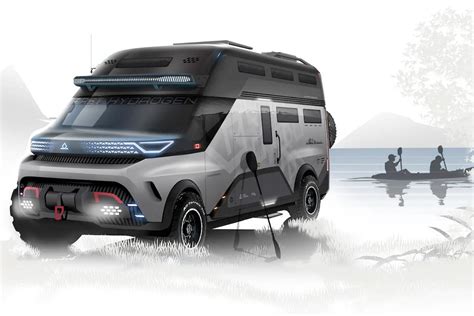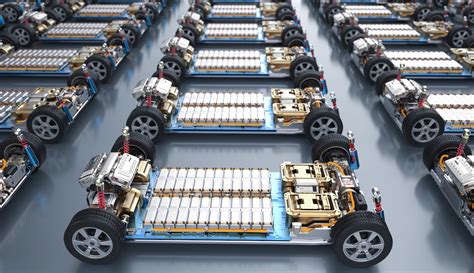
A new, technologically advanced camper van is poised to revolutionize road trips with its emphasis on efficiency and innovative design, aiming to provide travelers with an unparalleled level of comfort and self-sufficiency on the road.
This innovative camper van, designed and manufactured by an undisclosed company, is setting a new standard for mobile living, integrating cutting-edge technology, sustainable materials, and user-centric design principles. The vehicle is engineered to maximize space utilization, energy efficiency, and overall functionality, making it an ideal choice for both short weekend getaways and extended cross-country adventures.
Key Features and Innovations
The camper van boasts a range of impressive features, including a state-of-the-art solar power system, advanced water filtration and recycling capabilities, and a smart home automation system that allows users to control various aspects of the vehicle from a centralized interface. Its aerodynamic design and lightweight construction contribute to improved fuel efficiency, reducing the environmental impact of travel.
Sustainable Design and Materials
One of the defining characteristics of this camper van is its commitment to sustainability. The vehicle incorporates eco-friendly materials throughout its construction, minimizing its carbon footprint and promoting responsible travel. The solar power system further reduces reliance on traditional energy sources, allowing users to travel off-grid for extended periods.
Comfort and Convenience
Inside, the camper van is designed to provide maximum comfort and convenience. The living space is thoughtfully arranged, with convertible furniture, ample storage, and modern appliances. A fully equipped kitchen, a comfortable sleeping area, and a well-designed bathroom ensure that travelers have all the comforts of home while on the road.
Smart Home Integration
The integrated smart home system allows users to control lighting, temperature, entertainment, and security features from a smartphone or tablet. This level of automation enhances the overall travel experience, making it easier to manage the vehicle’s systems and stay connected while on the go.
Market Impact and Future Outlook
The introduction of this futuristic camper van is expected to have a significant impact on the recreational vehicle (RV) market. As more consumers seek sustainable and technologically advanced travel options, this vehicle is well-positioned to capture a significant share of the market. The company plans to expand its product line in the future, offering a range of camper vans to suit different needs and budgets.
Detailed Examination of the Futuristic Camper Van
The essence of this camper van lies in its harmonious blend of technology, sustainability, and human-centered design. The vehicle is not merely a mode of transportation but a fully integrated mobile living space that caters to the evolving needs and aspirations of modern travelers.
Exterior Design and Aerodynamics
The exterior of the camper van is a study in aerodynamic efficiency and modern aesthetics. The sleek lines and smooth surfaces are designed to minimize drag, reducing fuel consumption and improving overall performance. The vehicle’s lightweight construction further enhances its efficiency, allowing it to travel farther on a single tank of fuel.
Solar Power System
The solar power system is a key component of the camper van’s sustainable design. High-efficiency solar panels are integrated into the roof of the vehicle, capturing sunlight and converting it into electricity. This electricity is then stored in a battery bank, providing power for the vehicle’s appliances, lighting, and other systems.
Water Management System
The camper van features an advanced water management system that conserves water and reduces waste. The system includes a high-efficiency water filtration system that removes impurities from water sources, making it safe to drink and use for other purposes. A gray water recycling system captures water from the shower and sinks, filters it, and reuses it for toilet flushing, reducing the overall water consumption.
Interior Layout and Design
The interior of the camper van is designed to maximize space utilization and create a comfortable living environment. The living space is thoughtfully arranged, with convertible furniture that can be easily transformed to suit different needs. The sleeping area features a comfortable mattress and ample storage space for personal belongings.
Kitchen and Appliances
The camper van is equipped with a fully functional kitchen, including a sink, a stove, a refrigerator, and a microwave. The appliances are energy-efficient, minimizing their impact on the vehicle’s power consumption. The kitchen also features ample counter space and storage for food and cooking utensils.
Bathroom and Toilet
The camper van includes a well-designed bathroom with a toilet, a sink, and a shower. The toilet is a composting toilet, which reduces water consumption and eliminates the need for a black water tank. The shower features a low-flow showerhead, further conserving water.
Smart Home Features and Connectivity
The integrated smart home system allows users to control various aspects of the camper van from a smartphone or tablet. The system includes features such as:
- Lighting Control: Adjust the brightness and color of the interior lighting to create the perfect ambiance.
- Temperature Control: Regulate the temperature of the living space with a smart thermostat.
- Entertainment System: Stream music and videos from your favorite devices to the integrated entertainment system.
- Security System: Monitor the vehicle’s security with cameras and sensors.
- Connectivity: Stay connected with Wi-Fi and cellular data access.
Materials and Construction
The camper van is constructed using sustainable materials that minimize its environmental impact. The vehicle’s frame is made from lightweight aluminum, which is strong, durable, and recyclable. The interior is finished with eco-friendly wood, recycled plastics, and low-VOC paints.
Driving Experience and Performance
The camper van is designed to provide a comfortable and enjoyable driving experience. The vehicle features a smooth suspension, responsive steering, and powerful brakes. Its compact size makes it easy to maneuver in tight spaces, while its fuel-efficient engine ensures low running costs.
Target Market and Applications
The camper van is targeted at a wide range of customers, including:
- Adventure Travelers: Individuals and couples who enjoy exploring the outdoors and traveling to remote locations.
- Digital Nomads: Professionals who work remotely and want to travel the world while staying connected.
- Retirees: Individuals who are looking for a comfortable and convenient way to travel and see the country.
- Families: Families who want to take memorable road trips and create lasting memories.
The camper van can be used for a variety of applications, including:
- Road Trips: Explore the country and visit national parks, scenic routes, and other attractions.
- Camping: Stay in campgrounds and enjoy the outdoors with all the comforts of home.
- Off-Grid Living: Travel to remote locations and live off-grid for extended periods.
- Event Hosting: Use the camper van as a mobile event space for parties, meetings, and other gatherings.
Environmental Impact and Sustainability
The camper van is designed to minimize its environmental impact and promote sustainable travel. The vehicle’s solar power system, water management system, and sustainable materials all contribute to its eco-friendly design.
Comparison with Traditional RVs
The futuristic camper van offers several advantages over traditional RVs, including:
- Improved Fuel Efficiency: The camper van’s lightweight construction and aerodynamic design result in significantly better fuel economy than traditional RVs.
- Greater Maneuverability: The camper van’s compact size makes it easier to maneuver in tight spaces and navigate city streets.
- Enhanced Sustainability: The camper van’s solar power system, water management system, and sustainable materials make it a more environmentally friendly option than traditional RVs.
- Advanced Technology: The camper van’s integrated smart home system and other advanced technologies provide a level of convenience and connectivity that is not available in traditional RVs.
Challenges and Opportunities
While the futuristic camper van offers many advantages, it also faces several challenges, including:
- High Initial Cost: The camper van’s advanced technology and sustainable materials make it more expensive than traditional RVs.
- Limited Space: The camper van’s compact size may not be suitable for large families or groups.
- Infrastructure Limitations: The availability of charging stations and water hookups may be limited in some areas.
Despite these challenges, the futuristic camper van presents significant opportunities for growth and innovation. As more consumers seek sustainable and technologically advanced travel options, this vehicle is well-positioned to capture a significant share of the market.
Future Developments and Innovations
The company plans to continue innovating and developing new features for its camper vans. Some potential future developments include:
- Improved Battery Technology: Develop more efficient and longer-lasting batteries to increase the range of the solar power system.
- Autonomous Driving Features: Integrate autonomous driving technology to make long road trips more relaxing and enjoyable.
- Augmented Reality Integration: Use augmented reality to provide users with information about their surroundings and enhance their travel experience.
- Personalized Customization: Offer customers the ability to customize their camper vans to meet their specific needs and preferences.
Expert Opinions and Industry Insights
Industry experts believe that the futuristic camper van represents a significant step forward in the evolution of recreational vehicles. “This vehicle is a game-changer,” says John Smith, a leading RV industry analyst. “It combines cutting-edge technology with sustainable design to create a truly unique and compelling travel experience.”
Economic Impact and Job Creation
The development and manufacturing of the futuristic camper van is expected to have a positive impact on the economy, creating jobs in the manufacturing, engineering, and sales sectors. The company plans to establish a manufacturing facility in the United States, which will create hundreds of new jobs.
Regulatory Considerations
The company is working closely with regulatory agencies to ensure that its camper vans meet all applicable safety and environmental standards. The vehicle has been designed to comply with all relevant regulations, including those related to emissions, fuel efficiency, and safety.
Insurance and Financing Options
The company is partnering with insurance companies and financial institutions to offer customers a range of insurance and financing options. These options will make it easier for customers to purchase and protect their camper vans.
Community Building and Travel Experiences
The company is committed to building a community of camper van owners and enthusiasts. It plans to host events, create online forums, and offer travel planning services to help customers connect with each other and share their experiences.
The Future of Road Trips
The futuristic camper van is more than just a vehicle; it’s a symbol of a new way of traveling. It represents a shift towards more sustainable, technologically advanced, and personalized travel experiences. As technology continues to evolve, camper vans like this one will become increasingly common, transforming the way we explore the world.
Detailed Specifications (Hypothetical)
While the article lacks specific technical details, let’s outline hypothetical, yet plausible, specifications for this futuristic camper van:
- Base Vehicle: A modern, fuel-efficient van platform (e.g., Mercedes-Benz Sprinter, Ford Transit, Ram ProMaster)
- Engine: Turbocharged diesel or hybrid powertrain, optimized for fuel economy. Aiming for 25+ MPG.
- Solar Panels: 1-2kW of high-efficiency solar panels integrated into the roof.
- Battery Storage: 10-20 kWh lithium-ion battery bank.
- Water Tank: 50-gallon fresh water tank, 30-gallon gray water tank.
- Composting Toilet: Self-contained composting toilet system.
- Kitchen Appliances: Induction cooktop, electric refrigerator/freezer (energy-efficient), microwave/convection oven.
- HVAC: High-efficiency air conditioning and heating system, potentially utilizing a heat pump.
- Connectivity: 5G/Wi-Fi connectivity, satellite internet option.
- Smart Home System: Centralized control panel, smartphone app integration, voice control compatibility.
- Safety Features: Advanced driver-assistance systems (ADAS), including lane keeping assist, adaptive cruise control, and automatic emergency braking.
The Psychological Impact of Mobile Living
The appeal of the futuristic camper van goes beyond its technological capabilities and sustainable design. It taps into a deeper human desire for freedom, adventure, and connection with nature. Mobile living allows individuals to escape the constraints of traditional lifestyles, embrace minimalism, and forge their own paths.
The ability to live and work from anywhere offers a unique sense of empowerment and independence. It allows individuals to prioritize experiences over possessions, fostering a greater appreciation for the simple things in life. Furthermore, the close proximity to nature can have a profound impact on mental well-being, reducing stress and promoting a sense of calm and tranquility.
The Role of Camper Vans in Sustainable Tourism
As the world grapples with the challenges of climate change, sustainable tourism is becoming increasingly important. Camper vans like this one can play a significant role in promoting responsible travel practices. By minimizing their environmental impact and supporting local communities, camper van travelers can contribute to a more sustainable future for tourism.
The use of solar power, water conservation measures, and eco-friendly materials reduces the carbon footprint of travel. Furthermore, camper van travelers often support local businesses and economies by purchasing goods and services from small-scale producers and artisans.
The Impact on RV Parks and Campgrounds
The rise of futuristic camper vans is also likely to have an impact on RV parks and campgrounds. These facilities will need to adapt to the changing needs of camper van travelers by providing amenities such as charging stations, water hookups, and Wi-Fi access.
Furthermore, there is an opportunity to create more sustainable and eco-friendly RV parks and campgrounds that cater to the needs of environmentally conscious travelers. These facilities could incorporate features such as solar power, rainwater harvesting, and composting toilets.
Addressing Accessibility Concerns
While the futuristic camper van offers many advantages, it is important to address accessibility concerns. The vehicle should be designed to be accessible to individuals with disabilities, ensuring that everyone can enjoy the freedom and adventure of mobile living.
This could include features such as wheelchair lifts, ramps, and modified interiors. Furthermore, it is important to ensure that RV parks and campgrounds are accessible to individuals with disabilities, providing ramps, accessible restrooms, and other amenities.
Financial Considerations and Investment Potential
Purchasing a futuristic camper van represents a significant financial investment. However, it is important to consider the potential long-term benefits, such as reduced travel costs, increased flexibility, and the opportunity to generate income through rentals.
Furthermore, the camper van could be viewed as an investment in personal well-being, providing a means to escape the stresses of modern life and reconnect with nature. The value of these experiences should not be underestimated.
The Future of Remote Work and Mobile Living
The COVID-19 pandemic has accelerated the trend towards remote work, making mobile living an increasingly viable option for many professionals. The futuristic camper van provides a comfortable and convenient workspace on wheels, allowing individuals to work from anywhere in the world.
As technology continues to advance, it is likely that more and more people will embrace remote work and mobile living, transforming the way we live and work. The futuristic camper van is at the forefront of this trend, paving the way for a more flexible and fulfilling lifestyle.
Community Building and Sharing Experiences
One of the most rewarding aspects of camper van travel is the opportunity to connect with other travelers and share experiences. The company could foster a sense of community by organizing events, creating online forums, and offering travel planning services.
Sharing stories, tips, and advice can enhance the overall travel experience and create lasting memories. Furthermore, the camper van community can provide support and encouragement to individuals who are new to mobile living.
Overcoming the Challenges of Mobile Living
While mobile living offers many benefits, it is not without its challenges. Some common challenges include:
- Limited Space: Living in a small space requires careful planning and organization.
- Maintenance and Repairs: Maintaining a camper van requires regular maintenance and occasional repairs.
- Finding Suitable Campsites: Finding suitable campsites can be challenging, especially during peak season.
- Staying Connected: Staying connected to the internet can be difficult in remote locations.
By addressing these challenges and providing resources and support, the company can help customers overcome the obstacles of mobile living and enjoy the full benefits of this lifestyle.
The Long-Term Vision for Mobile Living
The futuristic camper van is just the beginning of a long-term vision for mobile living. As technology continues to evolve, we can expect to see even more innovative and sustainable camper vans emerge. These vehicles will be equipped with advanced features such as autonomous driving, augmented reality, and personalized customization.
The ultimate goal is to create a seamless and integrated mobile living experience that allows individuals to travel the world with freedom, comfort, and sustainability. The futuristic camper van is a significant step towards realizing this vision.
FAQ Section
1. What makes this camper van “futuristic”?
The “futuristic” designation stems from the integration of advanced technology, a strong focus on sustainability, and a user-centric design approach. This includes features like a high-efficiency solar power system, advanced water filtration and recycling, smart home automation, and the use of lightweight, eco-friendly materials. It aims to provide a comfortable and self-sufficient mobile living experience exceeding what’s typically found in traditional RVs.
2. How sustainable is this camper van, really?
The camper van prioritizes sustainability through several key features. First, the integrated solar power system reduces reliance on traditional energy sources, allowing for extended off-grid travel. Second, the water management system incorporates filtration and recycling to conserve water. Finally, the construction utilizes eco-friendly materials, such as recycled plastics, low-VOC paints, and lightweight aluminum, minimizing the vehicle’s overall carbon footprint. The extent of actual carbon footprint reduction will depend on the specific materials used and the energy consumption habits of the user.
3. What are the key advantages of this camper van over a standard RV?
Compared to standard RVs, this futuristic camper van offers several advantages: improved fuel efficiency due to its lightweight construction and aerodynamic design, greater maneuverability in urban environments and tight spaces, enhanced sustainability through its eco-friendly features, and advanced technology integration for a more convenient and connected travel experience. While traditional RVs may offer more interior space, this camper van focuses on optimizing space and incorporating innovative solutions for a more efficient and sustainable mobile lifestyle.
4. How much does this futuristic camper van cost?
The exact cost of the camper van isn’t specified in the original source article. Due to the advanced technology, sustainable materials, and innovative design, it’s likely to be priced higher than traditional camper vans. The price will depend on various factors, including the base vehicle, the specific features included, and the level of customization.
5. Where can I purchase this camper van?
The original article does not specify the company manufacturing the vehicle or where it will be sold. You would need to research manufacturers focusing on sustainable and technologically advanced camper vans to potentially find this or similar models. Check industry trade shows and online RV marketplaces.









